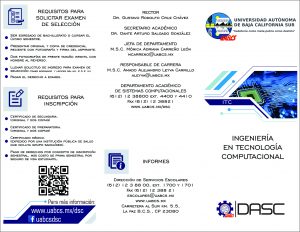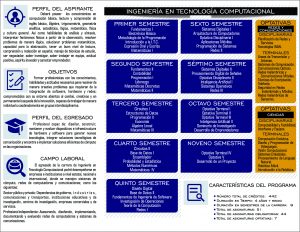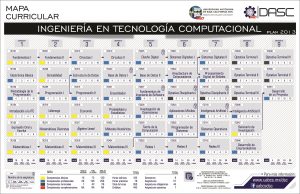Computer Technology Engineering
- Total number of credits: 442
- Duration in Time: 4 and a half years
- Duration in semesters of the course: 9
- Total number of subjects: 51
- Total required subjects: 44
- Total elective subjects: 7
- Educational Model: Based on competencies.
- Social Service: 600 hrs and six months minimum (regular seventh semester)
- Compulsory extracurricular activity: sports or culture (for one semester during the course of study)
- As a graduation requirement, students must accredit levels 1A, 1B, 2A and 2B of the English language (accredited by the Department of Foreign Languages of the UABCS).
To train professionals with the knowledge, skills and attitudes necessary to creatively solve problems that require the integration of software, hardware and networks; committed to their environment, open to change, creative and in permanent search for innovation, capable of working individually or in coordination with interdisciplinary groups.
Coming soon...
In addition to the entrance requirements indicated in the University Legislation on the General Enrollment Regulations, applicants to enter the Computer Technology Engineering program must possess the following characteristics:
Knowledge:Basic computing, reading and understanding of basic English, algebra, trigonometry, analytical geometry, statistics, logic, mathematics, physics and general culture.
Skills:Analysis and synthesis, interpretation of physical phenomena from observation, logical problem solving, mathematical problem solving, capacity for abstraction and analysis of the environment, good reading, comprehension and writing skills in Spanish, visualization of quick solutions to unforeseen situations, ability to present knowledge and ideas, organization and discipline at work, study skills, learning to learn, use of computer equipment, negotiation skills, research skills, teamwork skills.
Attitudes:Be positive, innovative spirit and entrepreneurial character, self-taught, critical, reflective, creative, dynamic and transforming, willingness to do research, willingness to work in interdisciplinary teams, discipline and respect towards the institution, teachers and classmates, and interest in understanding the operation of electronic devices and systems. These characteristics will be evaluated basically through the National Higher Education Entrance Exam (EXANI II), and other means and instruments that may be developed for this purpose, in order to determine the student's admission to the educational program. The admission process includes propaedeutic and induction courses, the former oriented to provide the basic and specific knowledge required by the career and the latter, oriented to provide a general knowledge of the school and institutional context.
The Computer Technology Engineer is a professional capable of: designing, building, maintaining and evaluating hardware and software devices and infrastructure to generate new technologies, integrating technological communication solutions, and finding and implementing efficient computing solutions in organizations:
Knowledge for:
- Analyze the fundamental aspects of a problem to design technological and practical solutions.
- Apply methodologies for the development of complete computational solutions including multidisciplinary problems.
- Design, develop and program control systems for the automation of processes that require complex computational systems.
- To face technological changes, adapting techniques and systems.
- Apply and responsibly adapt the new technologies of computer systems, networks and communications, according to the needs of the organizations, encouraging sustainable development.
- Manage and optimize time and cost of the resources involved in the development of a network and communications project.
- Understand the social, political, ecological and ethical factors related to technological development and professional performance.
- Undertake specialization and postgraduate studies.
Skills for:
- Participar en equipos interdisciplinarios, aplicando las tecnologías de cómputo actuales e incentivando el desarrollo sustentable de la organización.
- Understand, apply and communicate the process to determine customer needs and translate them into a project that requires the integration of software, hardware and networks to be applied to the organization.
- Design appropriate solutions in one or more areas of concentration that integrate ethical, social, legal and economic issues.
- Understand and apply standards, models and techniques that provide a basis for the design of networks and communications in the organization.
- Negotiate and work professionally, lead when necessary and communicate effectively.
- To develop an ethical-social sensitivity through the promotion of a dynamic, responsible, committed, integral and creative attitude.
Attitudes of:
- Leadership in multidisciplinary work teams.
- Perseverance in problem solving.
- Ability to keep up to date in their area of work.
- Eagerness to improve.
- Responsibility and ethics in their professional performance.
- Entrepreneurial and innovative behavior.
- Awareness of social reality and ecological responsibility.
- Self-taught learning.
Coming soon...
Subjects:
Electives Package
Networks and Communications
| Disciplinary Electives | Terminal Electives |
|---|---|
| Network and Service Planning | Transmission Lines and Antennas |
| WAN Technologies | Optical Communications |
| Encryption Techniques | |
| Wireless and Mobile Network Security | |
| Communication Systems | |
| Wireless Networks and Mobile Communications | |
| Telephones | |
| Wireless Sensor Networks |
Sciences
| Disciplinary Electives | Terminal Electives |
|---|---|
| Computability and Feasibility | Evolutionary Computing |
| Interfaces and Equipment | Computer Vision |
| Natural Language Processing | |
| Mobile Robotics | |
| Fuzzy Logic | |
| Video Game Design and Programming | |
| Embedded Systems | |
| High Performance Computing | |
| Robotics Introduction |



